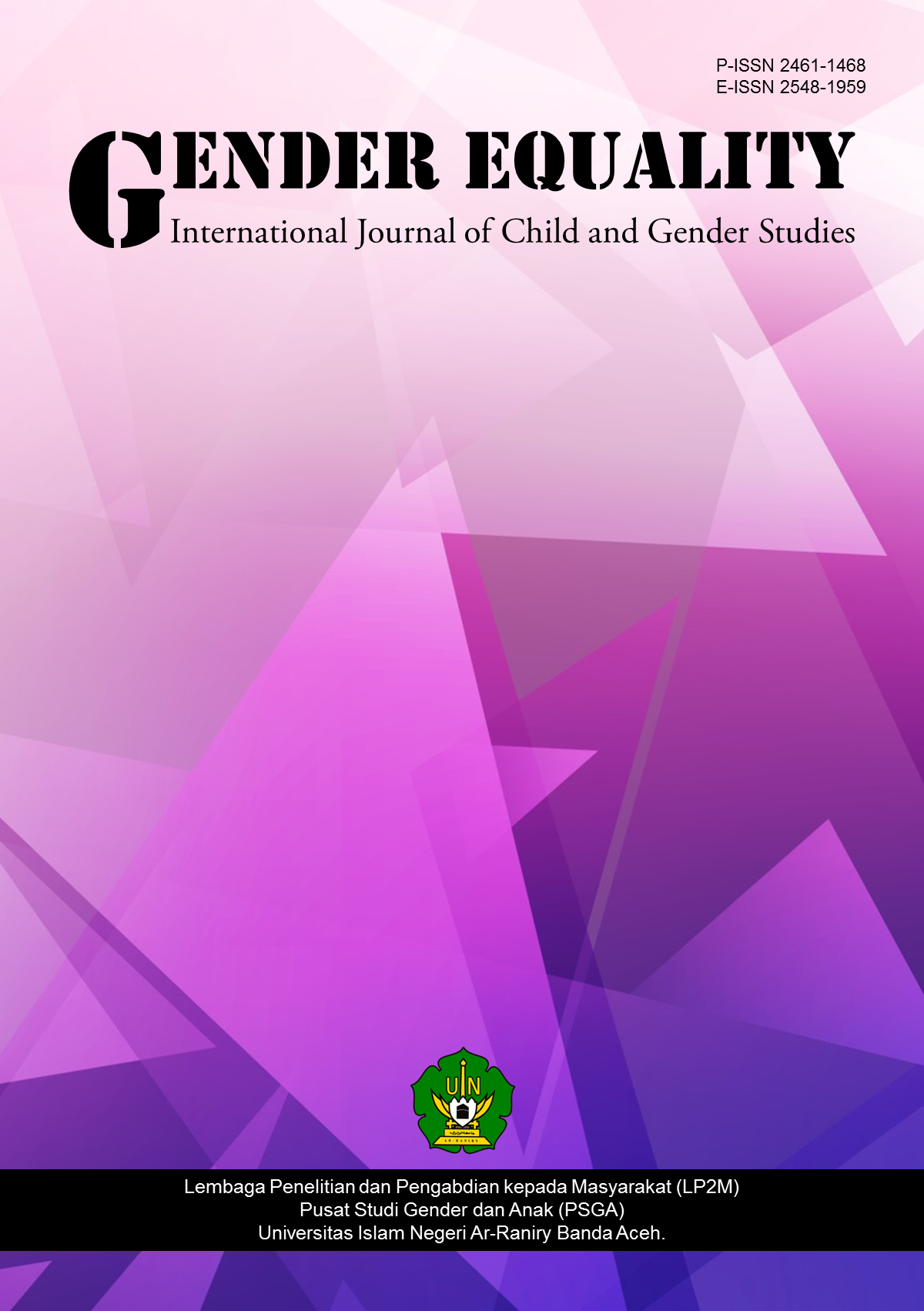EPISTEMOLOGI FIQH DAN KONTRIBUSINYA BAGI PENEGUHAN SPIRIT GENDER
DOI:
https://doi.org/10.22373/equality.v6i2.7750Keywords:
Gender, Islam, Fiqh, Epistimology.Abstract
This article specifically describes the fiqh epistemoloqy as a new perspective in analyzing how Islam views gender equality. Through fiqh epistemoloqy, which consists of three subdivions of reasoning: bayani, ta'lili, and isthilahi, the author analyzes how the construction of gender in Islam, which has been taken from its detailed dalils. The result of author's analysis shows that each three reasonings have their own tendency and influence toward the construction of gender spirit edification. Among the three fiqh espitomoloqy reasonings, only bayani reasoning is not quite relevant in analyzing gender-based religous texts. Gender is a social construct that involves roles and values that can be pinned on both female and male who, therefore, a gender-based dichotomy is not naturally stuck in human beings from birth. Islam places people in the same level not only to create a fair, affluent, and prosperous social order, but also because gender-based discrimination is a contraproductive form of dehumanization with the normative doctrine of islamic law. To reject the concept of gender is like opposing Islam's strategy as theological legitimacy over the concept of gender. The good and bad of humans in Allah's side, is not determined by whether he is male or female, but it is determined by the quality of his worship and obedience.
References
Abdullah, M. Amin. (1997). Studi Agama: Historisitas atau Normativitas?. Yogyakarta: Pustaka Pelajar.
Abidin, Zainal. (2015). “Kesetaraan Gender dan Emansipasi Perempuan dalam Pendidikan Islam” dalam Jurnal Tarbawiyah, 12: 01.
Abu Zahrah, Muhammad. (1958). Ushul al-Fiqh. Cairo: Dar al-Fikr al-Arab.
Al-Qurthubi, Abu Abdillah Muhammad ibn Ahmad ibn Abi Bakr ibn Farah. (1372 H). al-Jami’ li Ahkam al-Qur’an, Vol. V, Kairo: Dar asy-Sya’ab.
Al-Syathibi. (tt). al-Muwfaqt fi Ushul al-Ahkam. Beirut: Dar al-Fikr, jilid II.
Al-Wahidi. Asbab al-Nuzul al-Qur’an, Vol. I, dalam CD.Maktabah al-Syamilah.
Al-Zuhaili, Wahbah. (1989). al-Fiqh al-Islami wa Adillatuh, Vol. V, Beirut: Dar al-Fikr.
Asy-Syaukani, Muhammad ibn Ali ibn Muhammad. (tt) “Fath al-Qadir bain Fanni ar-Riwayah wa ad-Dirayah min Ilm at-Tafsir” Vol. I, Beirut: Dar al-Fikr.
At-Thabari, Abu Ja’far Muhammad ibn Jarir ibn Yazid ibn Khalid. (1405 H). Jami’ al-Bayan ‘an Ta’wil Ay al-Qur’an, Vol. V, Beirut: Dar al-Fikr.
Butler, Judith. (2004). Undoing Gender, Cet. Ke-X, New York & London: Routledge.
Connolly, Peter. Pnj. Imam Khoiri. (2001). Aneka Pendekatan Studi Agama. Yogyakarta: LKIS.
Ghufron, Fathorrahman. (2016). Dinamika Pemikiran Islam Indonesia dalam Perspektif Epistemologi Fiqh dan Kontribusinya bagi Peneguhan Semangat Kebangsaan dan Keindonesiaan dalam Jurnal Empirisma, 25: 2.
Hamka. (5th ed.). Tafsir al-Azhar. Singapura: Pustaka Nasional, jilid 8.
Heri Junaidi dan Abdul Hadi. (2010). Gender dan Feminisme dalam Islam dalam Jurnal Muwazah, 2: 2.
Husein, Muhammad. (2001). Fikih Perempuan: Refleksi Kiai atas Wacana Agama Dan Gender. Yogyakarta: LKIS.
Ilyas, Yunahar. (2002). Problem Kepemimpinan Perempuan dalam Islam dalam Jurnal Tarjih, 3.
Khuza’i, Moh. (2013). “Problem Definisi Gender: Kajian atas Konsep Nature dan Nurture” dalam Jurnal Kalimah, 11: 1.
Lestari. (2017). Pluralisme Agama dalam Pendidikan Islam: Internalisasi dan Karakterisasi Islam Rahmatan Lilalamin dalam Jurnal al-Muta’aliyah, 1.
Mead, Margaret. (1963). Sex and Temperament in Three Primitive Societies, Cet. Ke-III, New York: Morrow.
Qodir, Zuly. (2007). Islam Liberal. Yogyakarta: Pustaka Pelajar.
Rahman, Asjmuni A. (2004). Metode Penetapan Hukum Islam. Jakarta: Bulan Bintang.
Ramli, Mohd Anuar. (2012). “Analisis Gender dalam Hukum Islam” dalam Jurnal Fiqh, 9: 137-162.
Syarifuddin, Amir. (1997). Ushul Fiqih. Jakarta: PT. Logos Wacana Ilmu.
Umar, Nasaruddin. (2001). Argumen Kesetaraan Jender Perspektif al-Qur’an. Cet. Ke-II, Jakarta: Paramadina.
Zakaria, Samsul. (2013). “Kepemimpinan Perempuan dalam Persepektif Hukum Islam (Studi Komparatif antara Pemikiran KH. Husein Muhammad dan Prof. Siti Musdah Mulia)” dalam Jurnal Khazanah, 6: 1
Zuhri, Saifudin. (2009). Ushul Fiqh: Akal Sebagai Sumber Hukum Islam. Yogyakarta: Pustaka Pelajar.
Downloads
Published
Issue
Section
License
GENDER EQUALITY: International Journal of Child and Gender Studies allows the author(s) to hold the copyright and to retain the publishing rights without restrictions. Authors who publish with this journal agree to the following terms:
- Authors retain copyright and grant the journal right of first publication with the work simultaneously licensed under a Creative Commons Attribution License that allows others to share the work with an acknowledgment of the work's authorship and initial publication in this journal.
- Authors are able to enter into separate, additional contractual arrangements for the non-exclusive distribution of the journal's published version of the work (e.g., post it to an institutional repository or publish it in a book), with an acknowledgment of its initial publication in this journal.
- Authors are permitted and encouraged to post their work online (e.g., in institutional repositories or on their website) prior to and during the submission process, as it can lead to productive exchanges, as well as earlier and greater citation of published work.



